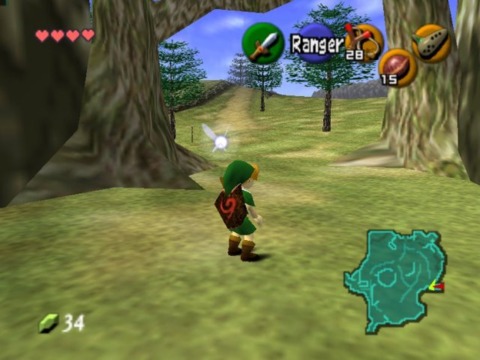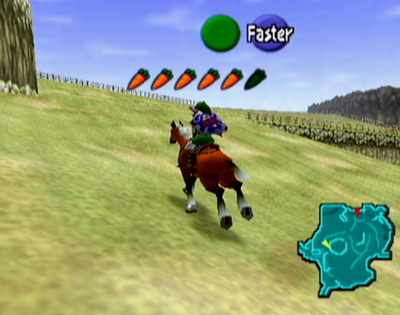Overblown Comparisons; or the Homeric Ocarina.
By Kieran_ES 2 Comments
If ever there was a representation of the collective mythoi of our society in video game form; traversing the traditional narrative of a journey of discovery, growth and maturity, it would undoubtedly be, for me, Ocarina of Time. I'm here saying this not as a rabid fan, but as someone who recently returned to the classic, with mild appraisal, intent on evaluating what about this experience tapped into so many young gamers back in 1998. The core success in Ocarina lies in the way Nintendo gears everything from aesthetic, thematic elements, gameplay and plot at creating a narrative of growing maturity and knowledge. Every item I gained, area I unlocked and change in aesthetic shows a progression in character that mirrors the plot of one special child having to mature rapidly, in time to save the world. As I step out into Hyrule Field, fresh and new in the world, everything is filled with the promise of a novel experience waiting for me. After each dungeon I've learnt new skills, grown as a player, and connected with the world in physical, real ways. This makes travelling back through the environment an emotional experience, as every area evokes memories and challenges past. This kind of interaction is the real narrative of a game. Plot and characters are a side show, the real meat of game narratives (and the area where the industry has to evolve) are the chronicles of experiences and the memories and emotions they instill. Narrative through gameplay, as also explored in Portal and Wii Sports, is done beautifully in Ocarina.


If we take Ocarina in this light, as the archetypal myth akin to The Odyssey, then we also have to consider it's inseparable counterpart; Majora's Mask. No two games better compliment eachother than this pair. Majora's Mask is the evolution, the expansion of the myth, using the structure of Ocarina to explore connections, what they mean and the emotional resonance they achieve. Majora examines your place in this world, as a hero. Termina is what Hyrule should have been, a bustling, living world with dozens of waiting citizens in need of your help. You as the hero, are just as dependent on them as they are on you. I found myself spending more time attempting to help these people than I did worrying about the dungeons or temples I had available; the connections I had forged carried over each time I skipped back to Day One, as I realised that I can't always be the hero to everyone. Majora's Mask is a more openly mature game than its predecessor. It replaces your physical and mental maturation with an emotional one and focuses on the deepening care you have for Termina and its inhabitants. This is reflected in Skull Kid. Instead of a traditional overarching evil, Skull Kid is someone to be sympathised with. He is, at heart, a wayward young boy; and by keeping Link in his child-like state you can empathise with him more directly.
Both Ocarina and Majora's Mask tap into the unifying mythology of world culture. Just as The Odyssey, Ulysses and Star Wars did, they chart the most inherent human experiences, and emotions. The loss of your innocence, discovery of adulthood, and all that comes with it. The Zeldas are a journey, an entwined push for a place in the world, and two of the greatest games ever made.
